Overview
Effective client information gathering is paramount for accountants, ensuring regulatory compliance and enhancing the accuracy of financial reporting. By adopting structured methods and technology, such as Glasscubes, firms can significantly improve efficiency, reduce errors, and elevate client engagement. This is evidenced by a remarkable:
- 40% rise in response rates
- 50% decrease in response times
Embrace this opportunity to transform your accounting practices and achieve unparalleled success.
Key Highlights:
- Effective client information gathering is essential for regulatory compliance and accurate financial reporting in accounting.
- Utilizing organized methods enhances efficiency, reduces errors, and improves customer satisfaction.
- Technology, such as Glasscubes, automates information gathering, leading to a 40% increase in response rates and a 50% reduction in response times.
- Common challenges include inconsistent communication and the complexity of managing multiple requests, exacerbated by traditional email methods.
- Structured templates and automated reminders streamline data collection and enhance accuracy.
- Clear communication pathways, like user portals, facilitate smoother interactions and improve client engagement.
- Feedback from clients is vital for refining data collection practices and ensuring continuous improvement.
- The trend towards digital solutions in accounting highlights the need for firms to adopt innovative tools to remain competitive.
Introduction
In the dynamic world of accounting, the ability to effectively gather client information is not merely advantageous; it is a critical component of success. As firms navigate the complexities of regulatory compliance and strive for accuracy in financial reporting, mastering this essential skill can set accountants apart as trusted advisors.
With the rise of innovative technologies like Glasscubes, the landscape of client engagement is evolving, offering streamlined processes that enhance communication and boost response rates. This article explores the significance of efficient client information gathering, the challenges accountants face, and the proven techniques that can transform the way firms interact with their clients.
By embracing these strategies, accountants can not only improve operational efficiency but also foster stronger, more collaborative relationships that are vital in today’s competitive environment.
The Importance of Effective Client Information Gathering in Accounting
In the accounting field, efficient client information gathering from customers is not merely a best practice; it is crucial for guaranteeing adherence to regulatory standards and improving the precision of financial reporting. Accountants who master this skill can provide more insightful advice and cultivate stronger relationships with customers. Organised methods of information collection enhance procedures, reduce mistakes, and greatly improve customer satisfaction.
As companies progressively embrace technology to aid interaction and client information gathering, the significance of effective information gathering becomes even more evident. Platforms of this type enhance customer interaction by offering automated tools, such as reminders that pursue individuals for replies, and real-time visual progress reports that distinctly display pending requests. Companies utilising Glasscubes have reported remarkable outcomes, including a 40% increase in customer response rates and a 50% reduction in response times—demonstrating how automation can alleviate workload bottlenecks and communication inefficiencies.
Significantly, Sophie Montgomery of TaxAssist Accountants indicated saving an impressive 288 hours in a single tax season, highlighting the considerable time reductions that can be attained. Furthermore, the capacity for client information gathering to collect precise customer details is increasingly acknowledged as a competitive edge. As 30% of companies actively seek to diversify their workforce, and 40% of new employees select firms based on reputation, the focus on efficient client information gathering is more crucial than ever.
Furthermore, with 24% of finance professionals intending to change jobs within a year, the necessity for firms to build a strong reputation through effective customer engagement is paramount. By addressing the limitations of traditional email communication—such as the risk of misplaced responses and the lack of organisation—Glasscubes ensures that all correspondence is contained within each audit request. By prioritising structured methods, supported by various tools, accountants can establish themselves as trusted advisors, ensuring they meet the evolving demands of the profession in 2025 and beyond.
Additionally, Glasscubes is secure, encrypted, and GDPR compliant, providing peace of mind for both firms and customers.
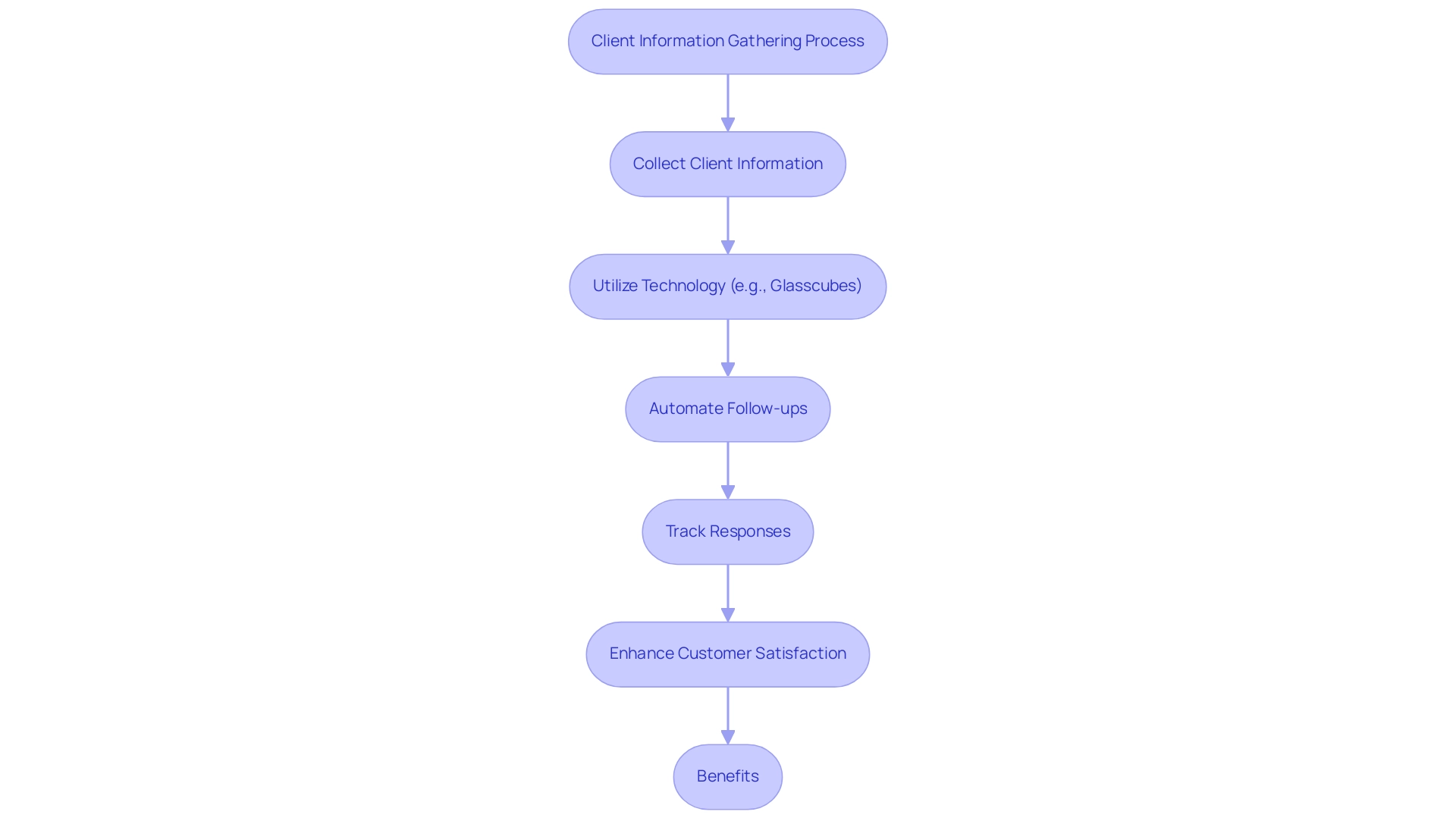
Common Challenges in Client Information Collection for Accountants
Accountants frequently encounter a myriad of challenges when gathering client information from customers. Inconsistent communication, delayed responses, and the complexities of managing multiple customer requests simultaneously stand out as key issues. Conventional methods, particularly email, often exacerbate these problems, leading to prolonged email threads where crucial details can easily become misplaced or repeated, frustrating both accountants and their clients.
Prior to adopting a certain platform, many companies would send clients an Excel document via email, only to face complications such as overlapping requests from different team members, further hindering the information-gathering process. This inefficiency underscores the pressing need for transformation, especially considering that over 50% of accounting executives anticipate that client information gathering will be profoundly impacted by automated and intelligent accounting systems in the coming years. Alarmingly, since 2020, the profession has seen a significant exodus, with 300,000 accountants and auditors leaving the field, representing a 17% decline, which further emphasizes the necessity for improved customer data collection strategies.
Moreover, the absence of a centralised system for tracking requests complicates the client information gathering process, making it difficult for accountants to maintain oversight and efficiency. The platform addresses these challenges by providing a secure, user-friendly system that simplifies the request and transfer of user details, significantly boosting response rates and reducing processing times. Specifically, this platform enhances personal tax management by streamlining the collection of essential tax documents and optimising payroll management, ultimately leading to greater customer satisfaction through clearer communication.
As the accounting landscape evolves, firms must adopt effective strategies for engaging customers and gathering client information to ensure client retention and future success. Additionally, the increasing focus on diverse recruitment strategies among accounting firms signifies a shift towards more adaptive engagement methods in response to industry changes. By leveraging Glasscubes, firms can overcome traditional hurdles and position themselves to better meet customer needs, ultimately enhancing their operational workflows.
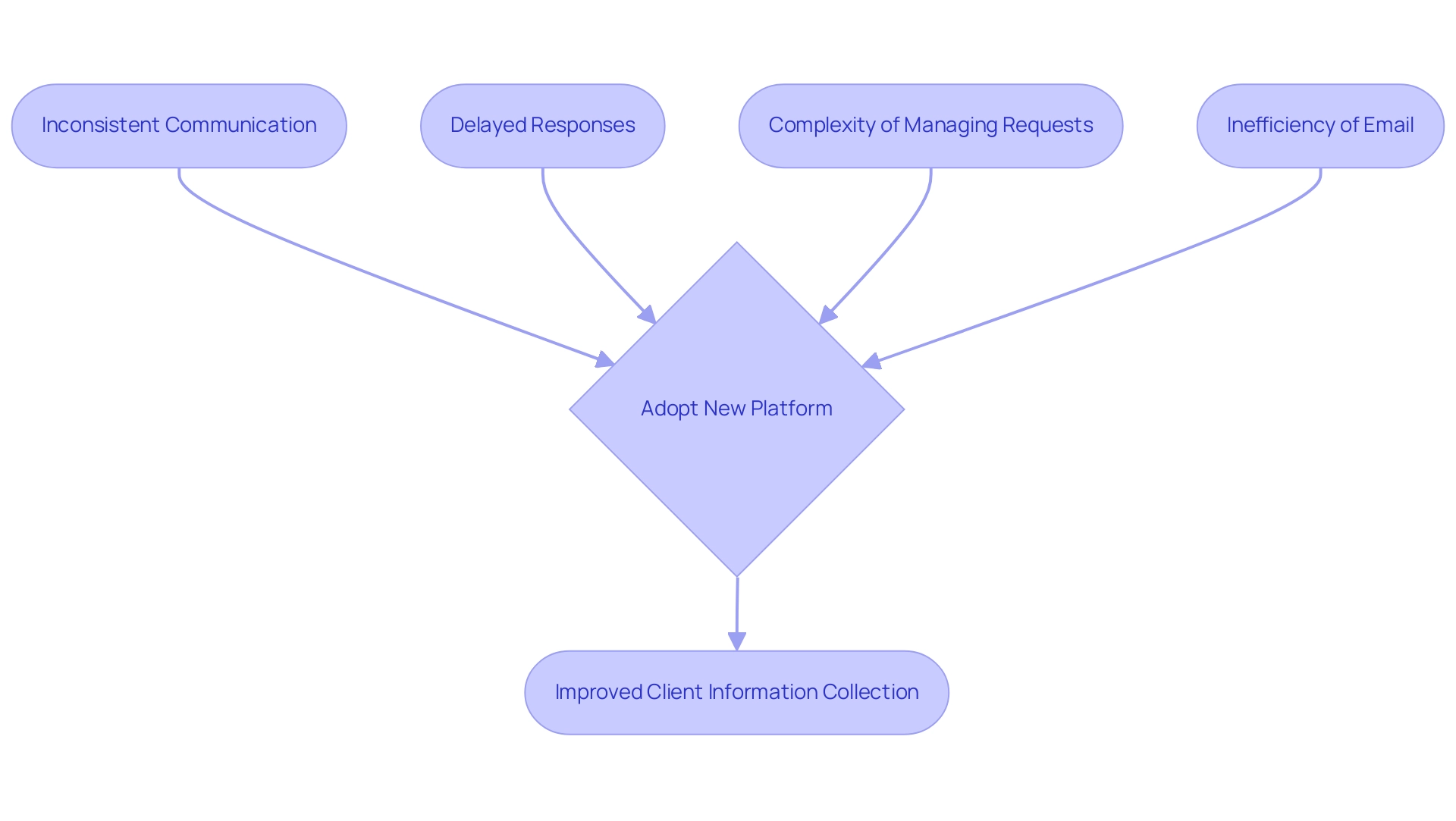
Proven Techniques for Efficient Client Information Gathering
To significantly enhance the efficiency of gathering data from customers, accountants can apply several established techniques. One effective approach is the use of structured templates for data collection, which standardises the details received and minimises errors and omissions. This method not only streamlines the process but also enhances the accuracy of the data collected, making it easier for accountants to analyse and act upon.
Furthermore, utilising Glasscubes’ automated reminder function can play a vital part in ensuring prompt responses from customers, thus minimising delays in communication. With the ability to send an unlimited number of customised reminders at strategic intervals, accountants can keep customers engaged and prompt them to provide necessary information without the need for constant manual follow-ups. This feature enables the customisation of messages and the establishment of specific frequencies for reminders, ensuring that interaction is both effective and relevant.
Statistics indicate that firms utilising automated reminders have reported significant improvements in customer response times, with some experiencing up to a 50% reduction in delays.
Creating clear communication pathways, such as specialised user portals, further enhances smoother interactions. These portals offer users easy access to essential documents and information, fostering a more organised approach to data collection. The user-friendly interface of Glasscubes requires no training, allowing users to navigate effortlessly and respond promptly.
As Ashley Malsbury, Community Happiness Systems Manager, noted, “The fact that we can just switch it on is something we never thought possible,” highlighting the ease of implementing such technology.
Moreover, regular follow-ups and check-ins, supported by automated reminders, reinforce the importance of timely responses, cultivating a culture of accountability among customers. This proactive engagement not only enhances response rates but also strengthens the overall client-accountant relationship.
Furthermore, by 2025, 65% of businesses will prioritise digital customer acquisition channels, underscoring the necessity for accountants to adopt these modern techniques. The anticipation for customised content by B2B purchasers by 2025 further highlights the necessity for personalised communication in gathering details. By merging these best practices with the functionalities of the platform, including its secure, encrypted, and GDPR-compliant features, accountants can optimise their data gathering processes, ultimately leading to improved customer satisfaction and operational efficiency.
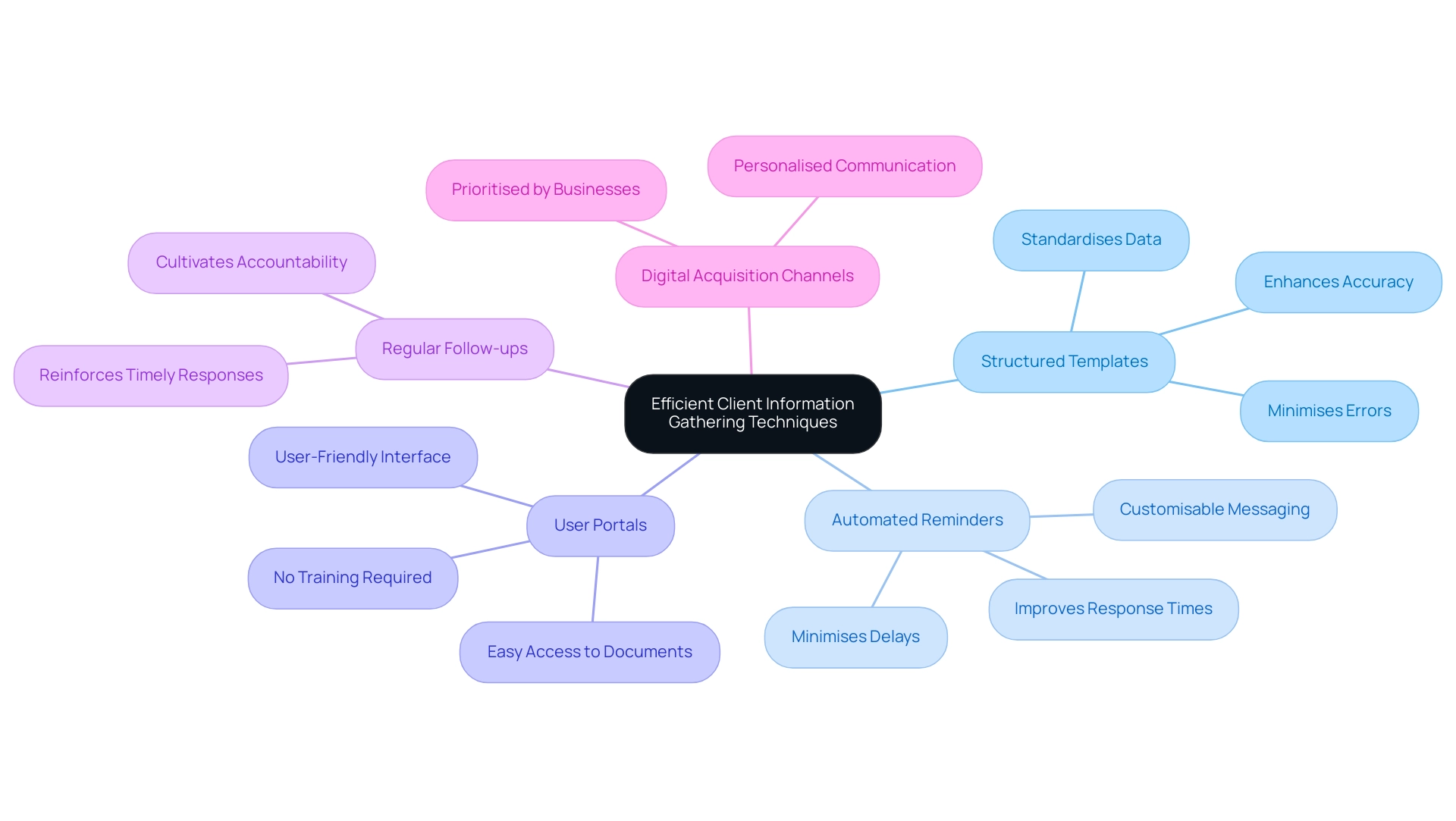
Leveraging Technology to Enhance Client Information Gathering
Technology is revolutionising client information gathering for accountants, with innovative solutions like Glasscubes leading the charge. This cutting-edge platform offers a secure and intuitive interface that centralises client information collection, automating reminders and significantly reducing the time accountants spend on follow-ups. An audit manager at MGI noted that since adopting Glasscubes, their team has experienced quicker responses from customers, as the platform enables users to effortlessly view outstanding requests without the burden of lengthy email trails.
This enhanced transparency has streamlined workflows and improved client engagement. Previously, extensive email chains often resulted in lost data, complicating the audit team’s ability to track essential information. The platform’s real-time reporting features empower accounting teams to monitor the status of client information gathering requests, thereby enhancing visibility and control over the data collection process.
Clients appreciate this structured approach to information gathering, as they can access the platform to verify their information needs, leading to greater satisfaction. In 2025, statistics indicate that 53% of accounting firms have adopted cloud-based practice management solutions, underscoring a significant shift towards technology-driven customer communication. This trend highlights the relevance of Glasscubes, aligning with the industry’s movement towards more efficient practices.
Moreover, firms utilising automated solutions for accounts payable have reported a remarkable 90-95% reduction in paperwork, along with a 20-27% increase in overall efficiency. These statistics illustrate the concrete advantages of integrating technology into accounting practices, reinforcing the critical role such solutions play in enhancing operational effectiveness.
Case studies further demonstrate the efficiency of these tools; for instance, firms diversifying their services by incorporating advisory roles have not only adapted to industry changes but also improved their customer engagement strategies. By embracing this platform, these firms have witnessed a notable increase in customer response rates and a significant reduction in response times, showcasing the platform’s impact on operational efficiency. As the accounting landscape evolves, adopting technology is essential for firms seeking to improve their client information gathering methods.
Additionally, with the U.K. accounting sector experiencing a slight increase in the number of accountants, reaching 1.28 million, and a median annual salary of £71,550, the importance of effective tools for customer engagement becomes even more pronounced in a competitive market. Steve highlighted that Glasscubes provided exceptional support during the setup process, responding promptly to inquiries, which facilitated a seamless transition to this new system.
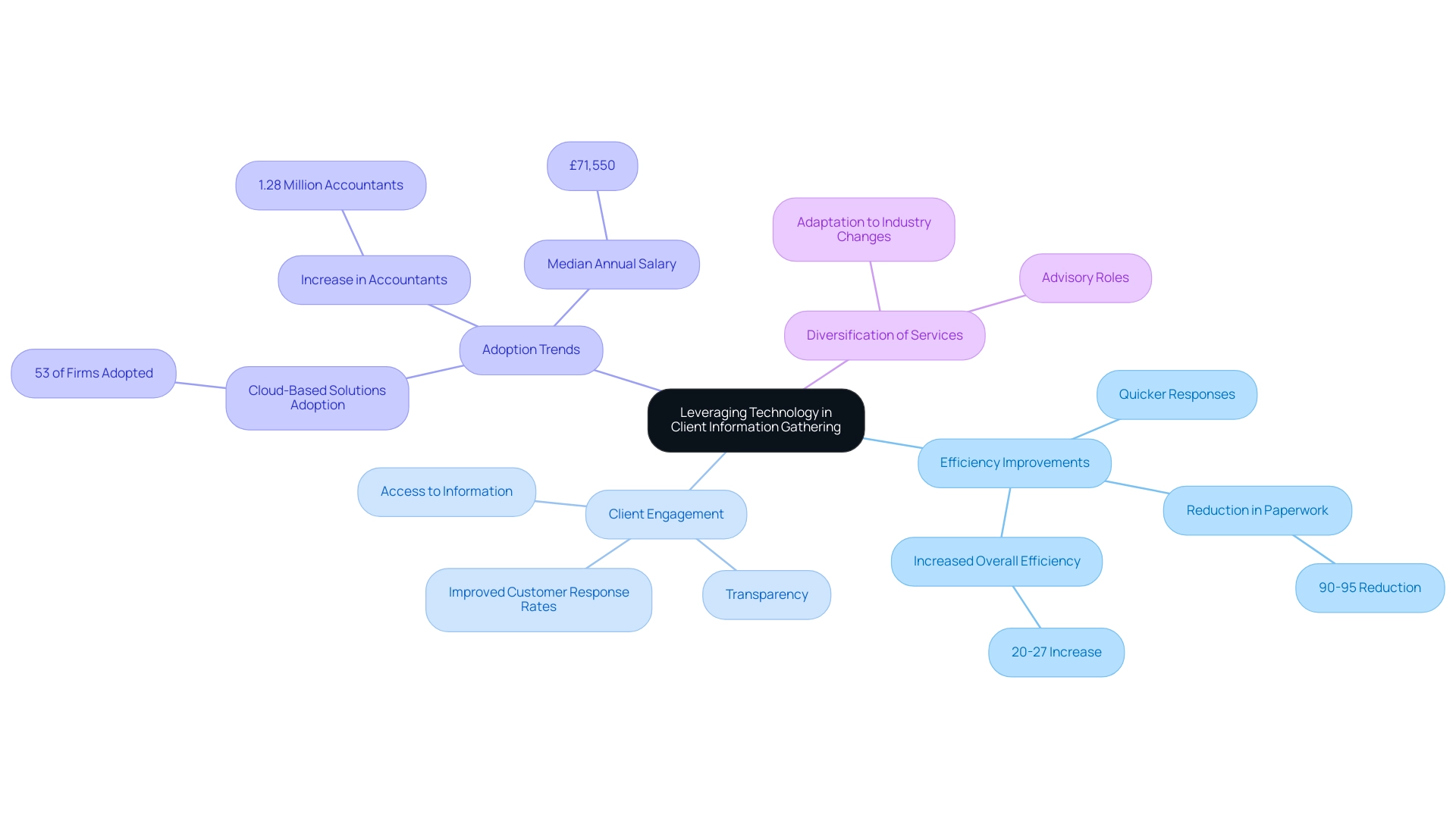
Building Strong Client Relationships Through Effective Communication
Establishing robust connections with customers fundamentally relies on effective dialogue throughout the data collection phase. In 2025, accountants must prioritise clear and consistent interaction to ensure customers fully understand the necessary information and associated timelines. Regular updates and proactive outreach not only keep individuals informed but also foster a sense of engagement and value, significantly enhancing response rates.
Adjusting styles of interaction to match personal preferences is crucial for enhancing satisfaction and trust. For instance, studies indicate that 48% of knowledge workers are more likely to address concerns quickly when communicated with in a positive tone, underscoring the importance of a thoughtful approach to interactions. By promoting open channels of dialogue, accountants can cultivate a cooperative atmosphere that motivates customers to supply essential information swiftly and correctly.
Moreover, firms that have adopted innovative interaction tools, such as Glasscubes, have reported a remarkable 40% increase in client response rates and a 50% reduction in response times. This statistic highlights the tangible benefits of effective interaction strategies in accounting. Additionally, with 74% of businesses adopting new tools for organising and managing interactions in the past year, it is clear that the trend towards innovative solutions is gaining momentum in the industry.
As Carla Caldwell notes, “The likes of Chad Davis and Carla Caldwell are showing the world that accountants can do powerful things with automation, AI, and tech in general.” This strengthens the notion that utilising technology, such as Glasscubes, can significantly improve interaction strategies for accountants. Furthermore, accountants can assist customers in broader contexts, such as environmental responsibility, by employing these interaction tools effectively.
By implementing tailored communication approaches, accountants can not only enhance engagement with customers but also strengthen the overall relationship, paving the way for long-term success.
Discover how we transform customer engagements in just 4 minutes! Watch our on-demand demonstration to see how we simplify data collection: Obtain quicker, superior-quality replies from customers. Avoid workload bottlenecks and delays.
Save hundreds of hours of effort. Where should we send the link? Submit.
Join firms like Menzies that have seen a 40% improvement in client response times. Prefer a tailored experience? Click here to schedule a personalised demo with one of our Product Specialists.
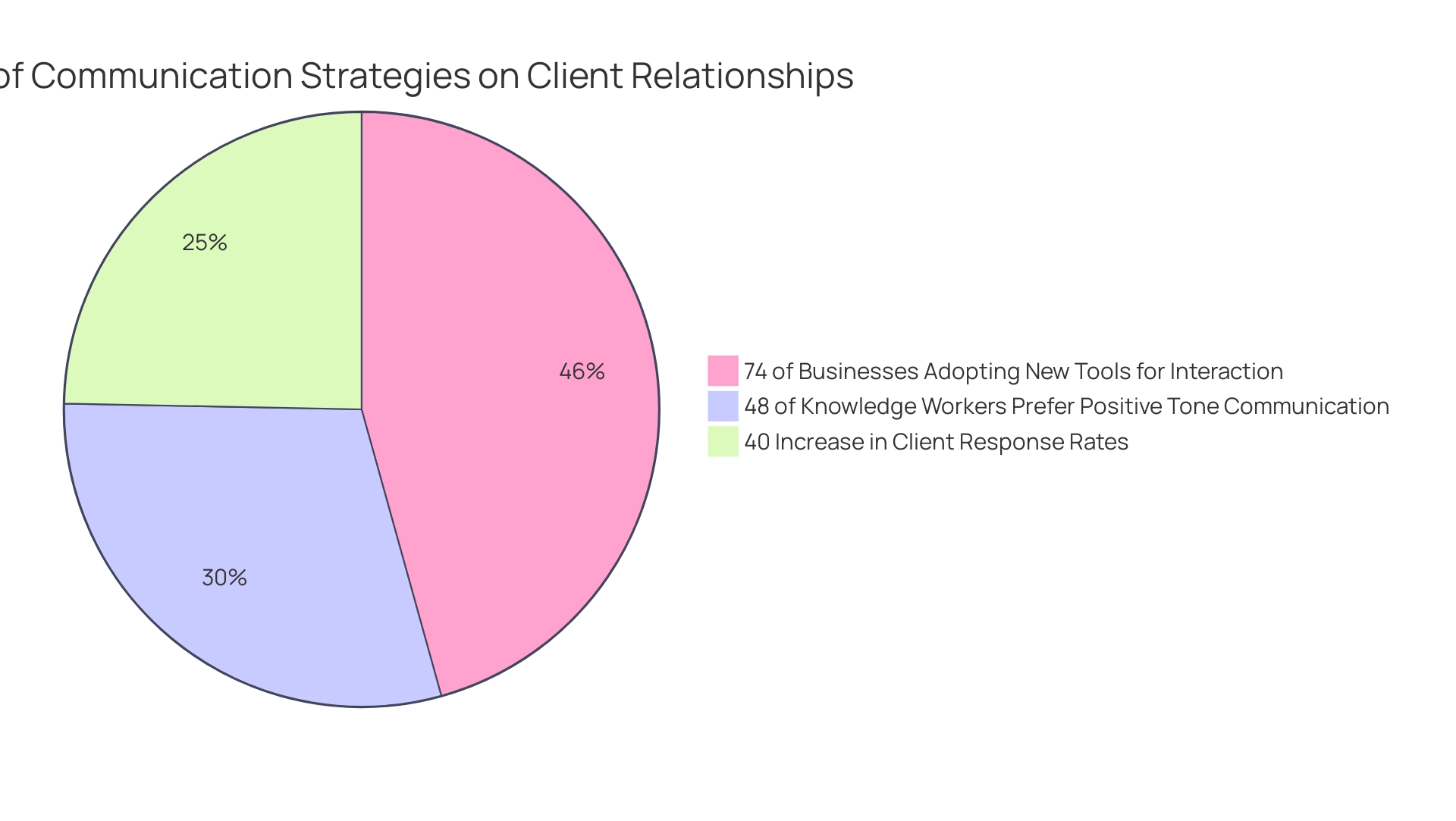
The Role of Feedback in Improving Information Gathering Practices
Client feedback plays a pivotal role in refining data collection practices for accountants, particularly when transitioning to tools like Glasscubes. By proactively soliciting feedback on the data collection process, accountants can pinpoint specific areas for enhancement and tailor their strategies accordingly. Many companies previously relied on extensive email exchanges for data collection, often resulting in lost details and duplicate requests, as various members of the audit team would ultimately ask for the same piece of data.
This inefficiency caused considerable frustration, complicating the monitoring of gathered data. In contrast, Glasscubes streamlines this process through automated communication and information-gathering tools, significantly enhancing customer engagement.
Implementing changes based on customer feedback not only optimises the information-gathering process but also reinforces to customers that their opinions are genuinely valued. This responsive approach cultivates a culture of continuous improvement, essential in today’s fast-paced accounting environment. Firms using Glasscubes have reported a remarkable 40% increase in customer response rates and a 50% reduction in turnaround times, demonstrating the real-time reporting and automated workflows that enhance overall efficiency.
Moreover, expert insights indicate that organisations embracing data-driven performance management are three times more likely to meet their business objectives. This underscores the significance of utilising customer feedback as a strategic instrument for improving accounting practices. As noted by PwC, 80% of employees now prefer ongoing feedback over traditional annual reviews, highlighting the need for continuous customer engagement.
By fostering open lines of communication and actively engaging clients in the feedback process, accountants can improve their information-gathering techniques while strengthening client relationships. This ultimately leads to more effective and responsive accounting services.
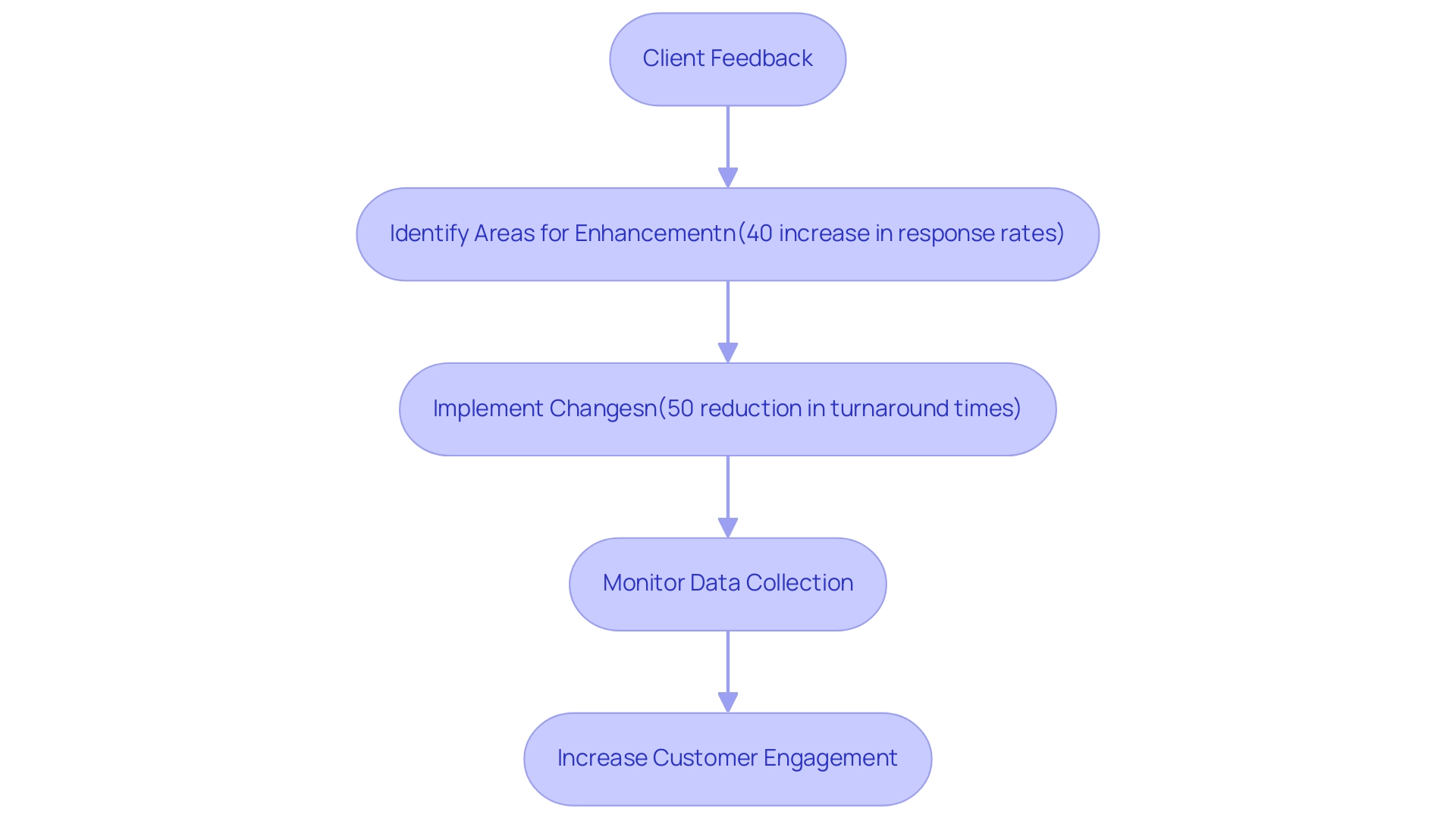
Conclusion
Effective client information gathering is essential for the success of accounting firms, providing a pathway to enhanced compliance, accuracy, and client satisfaction. The integration of technology, particularly platforms like Glasscubes, revolutionises how accountants engage with clients. By automating reminders and centralising communication, firms experience substantial improvements in response rates and efficiency, leading to significant time savings and operational effectiveness.
Traditional methods, such as email, present challenges that highlight the urgent need for innovative solutions. Streamlining processes and eliminating confusion allows accountants to focus on delivering insightful advice rather than managing administrative hurdles. Moreover, personalised communication strategies foster stronger relationships, ensuring clients feel valued and understood.
In an increasingly competitive landscape, firms that prioritise efficient information gathering not only enhance their service delivery but also position themselves as trusted advisors. Embracing these modern techniques and tools is not merely a strategic advantage; it is essential for thriving in the evolving accounting environment. By committing to a culture of continuous improvement and leveraging client feedback, accountants can refine their practices, ultimately paving the way for long-term success and stronger client collaborations.
